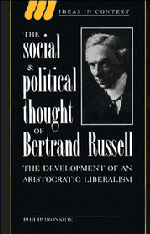Book contents
- Frontmatter
- Contents
- Acknowledgements
- Introduction
- 1 A young man of character
- 2 Fellow-travelling with the Fabians
- 3 Out of the moral gymnasium
- 4 Political science
- 5 The sage of Caxton Hall
- 6 Anarchist tendencies
- 7 Russia, China, and the West
- 8 The Wellsian trajectory
- 9 Ideologies and dystopias
- Epilogue: Russell and the idea of the clerisy
- Notes
- Bibliography
- Index
- IDEAS IN CONTEXT
3 - Out of the moral gymnasium
Published online by Cambridge University Press: 31 August 2009
- Frontmatter
- Contents
- Acknowledgements
- Introduction
- 1 A young man of character
- 2 Fellow-travelling with the Fabians
- 3 Out of the moral gymnasium
- 4 Political science
- 5 The sage of Caxton Hall
- 6 Anarchist tendencies
- 7 Russia, China, and the West
- 8 The Wellsian trajectory
- 9 Ideologies and dystopias
- Epilogue: Russell and the idea of the clerisy
- Notes
- Bibliography
- Index
- IDEAS IN CONTEXT
Summary
In this chapter and the next I shall offer parallel accounts of Russell's peculiarly complex development during the years 1900 to 1915: the first of these will be concerned with matters primarily psychological, the second with matters mainly political. Taken together, these chapters are intended to supply a coherent interpretation of Russell's intellectual strategy during this period and also to provide a background for what is arguably his most important theoretical text in the area of social thought, Principles of Social Reconstruction.
During these years changes took place in Russell's notion of character which transformed his conception of human nature in general, changes which can perhaps best be illustrated by comparing his views on education in 1902 with those he held in 1916. In 1902 he had been impressed by Graham Wallas's paper ‘A Criticism of Froebelian Pedagogy’ and expressed his agreement with an anti-Froebelian stance in correspondence with the author:
The broad fact on which one would take one's stand in opposing Froebel is, I suppose, original sin, and (what is just as bad) original stupidity. I have more sympathy with Calvin than with Rousseau, if one must look to Geneva for guidance. Indeed, I have seldom known people attain a high moral level unless their childhood had been very stern and almost destitute of happiness.
- Type
- Chapter
- Information
- The Social and Political Thought of Bertrand RussellThe Development of an Aristocratic Liberalism, pp. 38 - 59Publisher: Cambridge University PressPrint publication year: 1995



